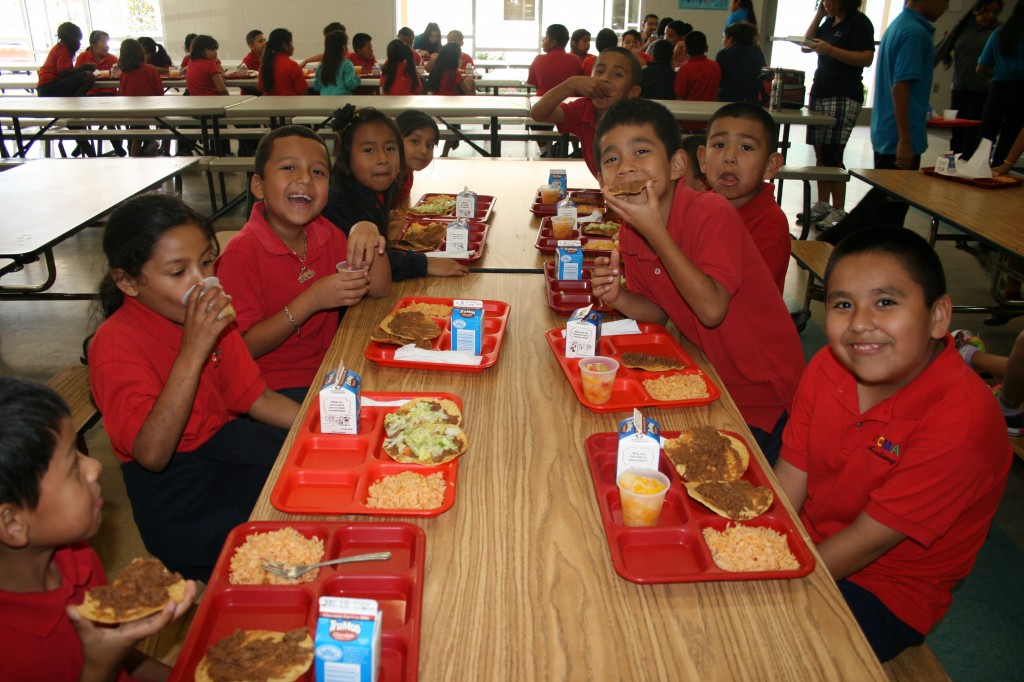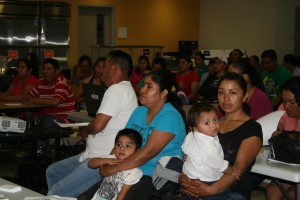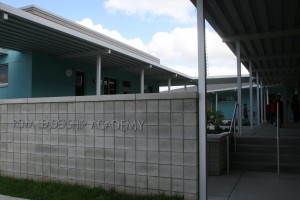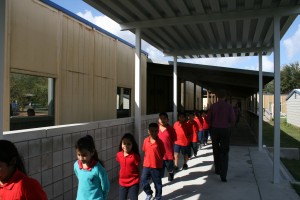
Second-graders at the Academies of RCMA in Wimauma, Fla., enjoy a favorite for lunch: tostadas. It's the little things that help school leaders forge bonds with the children and their parents.
As dusk settled on the Academies of RCMA, students sat in classrooms while more than 150 moms and dads filled long tables inside the cafeteria.
It was Parents Night at the Wimauma charter school and even though many worked all day picking crops in nearby fields, they stayed for the whole hour.
Teachers and administrators at the coveted school say they have more freedom than most traditional public schools to develop programs that address the needs of their mostly Hispanic population.

More than 150 moms and dads come to Parents Night, where they learn how to help their children - and themselves.
But the school doesn’t limit its help to students. Founded by the Redlands Christian Migrant Association, it’s committed to reaching out to parents, as well.
“They know they struggle,’’ said Marcela Estevez, the academies’ parent liaison and director of student affairs. “They work hard. But they know the school. They rely on the school.’’
More than 80 percent of RCMA’s 258 middle and elementary students live in households headed by single moms, and 35 percent to 40 percent are from migrant farmworker families, Estevez said. Practically every child qualifies for free breakfast and lunch.
RCMA, which is located behind the Beth-El Farmworker Ministry, focuses on students’ basic needs first, such as food and clothing. Then the goal is on acclimating them to English while still celebrating their culture, said Mark Haggett, director of the academies.
It takes creativity and ingenuity, Haggett said. RCMA receives about $5,300 in state funding for each student – a few thousand less than district schools get once construction costs are considered. To make up for it, the school actively seeks donations.
In 2010, RCMA received $100,000 from John Kirtley, chairman of Step Up For Students, the nonprofit that oversees tax credit scholarships in Florida and the co-hosts this blog. Another $100,000 came from a Walton Family Foundation grant. The academies also have numerous community partnerships, such as the one with Gary Wisnatzki of Wish Farms in Plant City that brought the school $300,000.

Community donations helped pay for the $3.1 million addition so students could remain at the charter school through eighth grade.
Those dollars helped expand the RCMA Wimauma Academy elementary school with the construction of a $3.1 million middle school, the RCMA Leadership Academy, and cafeteria. RCMA welcomed sixth-graders in 2011-12, and added seventh-graders this school year.
Inside the cafeteria, students enjoy a salad bar and traditional offerings like chicken nuggets. But at least once a week, they get a taste of home with favorites like tostadas, enchiladas and beans with rice.
Other little things forge bonds, too, like recognizing Three Kings Day around Christmas; taking field trips to the Straz Center for the Performing Arts in Tampa; and touring Lennard High School in nearby Ruskin and the Hillsborough Community College campus next door.
The lesson: There’s so much to explore beyond Wimauma and after high school.
Like many of the fifth-graders he oversees, aide Sonny Juarez came from a migrant family. “They didn’t want the same life for me,’’ said Juarez, 25. He graduated from high school and now studies education at the University of South Florida.
His students see a role model. They call him “school boy.”
“I’m trying to get them to know there is other stuff out there,” Juarez said. “They don’t have to work in the fields. They can be anything they want.’’
In the classroom, kindergarteners spend about half of their first semester speaking Spanish with the teacher. By the end of the year, instruction is mostly in English. Bilingual aides help students transition to the next grades, continuing to read to them in Spanish to help strengthen dual language skills.
Other measures add up, like letting the children chart their own test results. It reinforces math lessons and helps them understand where they stand and what they need to do to improve, Haggett said.
Students answer questions like, “What will you do to become smarter in reading and math?’’ Some vow to read more at home; others say they will study longer. Either way, they learn to take responsibility.
In the last decade, the elementary school earned six A grades from the state. But in the past two years, as the school added sixth- and seventh-graders, the grade fell to a C.

Students head to lunch at the Academies of RCMA charter school, where administrators try to be creative when it comes to addressing the needs of their mostly Hispanic population. Some teachers only speak Spanish to students, to help show respect for their culture. Others organize field trips to introduce the children to the world beyond Wimauma and school.
Haggett points to the transition and, like a lot of school administrators, to a new and tougher version of the state’s standardized test.
“With our population, we’re always going to struggle,’’ he said.
But the road will probably be that much harder as Florida and 45 other states embrace Common Core standards. To succeed, RCMA teachers will need to find more strategies for English language learners, Haggett said, something they are training for now.
The school also must keep building on its relationship with parents.
Because the school is small, teachers get to know parents by first name. At the start of the school year, moms and dads sit at their child’s desk, walk the halls between bells and review their assignments.
“It gives them an idea of what’s expected,’’ Haggett said.
Part of the expectation is parents will attend monthly meetings. Almost all do, said Estevez, who used to work for the Mexican Consulate in Orlando.
At this month’s meeting, those with students in kindergarten through second grade sat quietly through one presentation on filing income taxes, then another about communicating effectively with their kids. Babies fussed as the clock neared 7 p.m., but no families left early.
Some moms lingered for half an hour to talk to Estevez about things that had nothing to do with school, at least not directly - Medicaid plans, doctors and dentists, even eyeglasses.
To show respect and foster trust, she spoke to them only in Spanish.
And she stayed until the last parent went home.